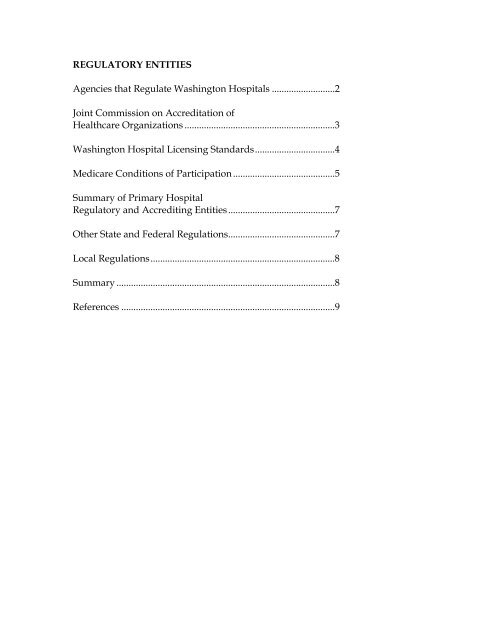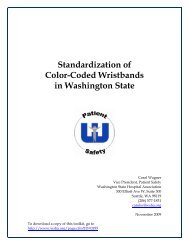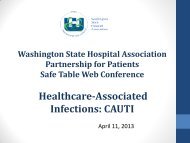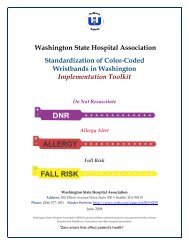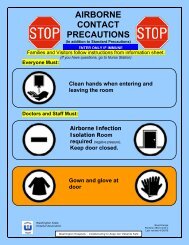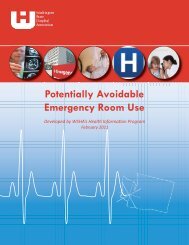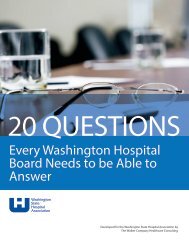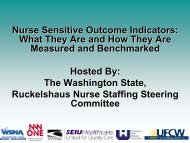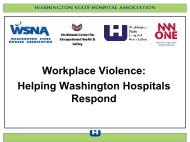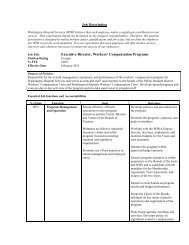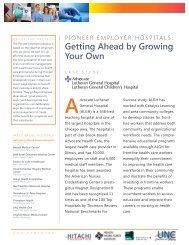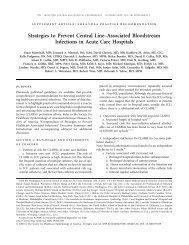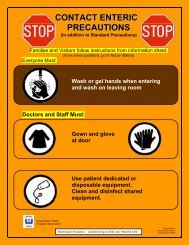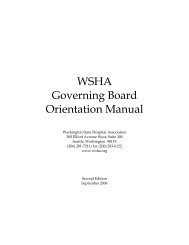Joint Commission on Accreditation of Healthcare Organizations
Joint Commission on Accreditation of Healthcare Organizations
Joint Commission on Accreditation of Healthcare Organizations
Create successful ePaper yourself
Turn your PDF publications into a flip-book with our unique Google optimized e-Paper software.
REGULATORY ENTITIESAgencies that Regulate Washingt<strong>on</strong> Hospitals ..........................2<str<strong>on</strong>g>Joint</str<strong>on</strong>g> <str<strong>on</strong>g>Commissi<strong>on</strong></str<strong>on</strong>g> <strong>on</strong> Accreditati<strong>on</strong> <strong>of</strong><strong>Healthcare</strong> Organizati<strong>on</strong>s ..............................................................3Washingt<strong>on</strong> Hospital Licensing Standards.................................4Medicare C<strong>on</strong>diti<strong>on</strong>s <strong>of</strong> Participati<strong>on</strong> ..........................................5Summary <strong>of</strong> Primary HospitalRegulatory and Accrediting Entities............................................7Other State and Federal Regulati<strong>on</strong>s............................................7Local Regulati<strong>on</strong>s............................................................................8Summary ..........................................................................................8References ........................................................................................9
2Hospitals must comply with a number <strong>of</strong> regulati<strong>on</strong>s to carry out state andfederal laws. The two primary reas<strong>on</strong>s for health care regulati<strong>on</strong>s are theprotecti<strong>on</strong> <strong>of</strong> the health and safety <strong>of</strong> patients and the government’s major role inpaying for health care, through Medicare and Medicaid programs.In additi<strong>on</strong> to providing a range <strong>of</strong> health care services, hospitals must obtainmultiple licenses and undergo numerous surveys. For example, a hospital that<strong>of</strong>fers acute care, home health care, hospice care and l<strong>on</strong>g-term care must have
3separate surveys and a different license for each service. This is in additi<strong>on</strong> tothe hospital’s license and Medicare certificati<strong>on</strong>.Trustees should also have an understanding <strong>of</strong> the cost <strong>of</strong> complying withregulati<strong>on</strong>s. Often, compliance requires the purchase <strong>of</strong> special supplies, hiring<strong>of</strong> additi<strong>on</strong>al staff, architectural changes to a facility or the provisi<strong>on</strong> <strong>of</strong> servicesthat are costly to maintain.JOINT COMMISSION ON ACCREDITATION OF HEALTHCAREORGANIZATIONSFor decades, hospitals participated in a voluntary self-regulatory process. In theearly 1950s, a program <strong>of</strong> hospital self-inspecti<strong>on</strong>, sp<strong>on</strong>sored by the AmericanCollege <strong>of</strong> Surge<strong>on</strong>s, began expanding into the present <str<strong>on</strong>g>Joint</str<strong>on</strong>g> <str<strong>on</strong>g>Commissi<strong>on</strong></str<strong>on</strong>g> <strong>on</strong>Accreditati<strong>on</strong> <strong>of</strong> <strong>Healthcare</strong> Organizati<strong>on</strong>s (JCAHO). Originally, the “<str<strong>on</strong>g>Joint</str<strong>on</strong>g><str<strong>on</strong>g>Commissi<strong>on</strong></str<strong>on</strong>g>” surveyed and accredited <strong>on</strong>ly hospitals. Today JCAHOaccreditati<strong>on</strong> includes critical access hospitals, pathology and clinical laboratoryservices, home health agencies, behavioral health care services, l<strong>on</strong>g-term carefacilities, ambulatory care centers, health care networks and managed care. The<str<strong>on</strong>g>Joint</str<strong>on</strong>g> <str<strong>on</strong>g>Commissi<strong>on</strong></str<strong>on</strong>g> c<strong>on</strong>ducts a voluntary survey program <strong>of</strong> hospitals. A hospitalmust request and pay for a survey.Approximately two-thirds <strong>of</strong> hospitals in Washingt<strong>on</strong> state are accredited byJCAHO. More informati<strong>on</strong> about JCAHO accreditati<strong>on</strong> can be found <strong>on</strong> theJCAHO website, www.jointcommissi<strong>on</strong>.orgJCAHO SURVEY AND STANDARDS OVERVIEWA multi-disciplinary inspecti<strong>on</strong> team spends at least two days in the hospital.Standards that measure plant safety, medical staff, quality assurance, departmentservices and what the hospital is doing to improve the quality<strong>of</strong> its services are used. The <str<strong>on</strong>g>Joint</str<strong>on</strong>g> <str<strong>on</strong>g>Commissi<strong>on</strong></str<strong>on</strong>g> wants to see mechanisms andprocesses in place to ensure that the Board has an oversight role in thecredentialing <strong>of</strong> the medical staff, quality assurance and c<strong>on</strong>tinuousimprovements <strong>of</strong> the care provided by the hospital. The <str<strong>on</strong>g>Joint</str<strong>on</strong>g> <str<strong>on</strong>g>Commissi<strong>on</strong></str<strong>on</strong>g>awards a three-year accreditati<strong>on</strong> to hospitals that meet its standards. In somecases, it makes receiving accreditati<strong>on</strong> part <strong>of</strong> meeting certain standards betweensurveys. If these standards are not met, c<strong>on</strong>diti<strong>on</strong>al accreditati<strong>on</strong> or denial <strong>of</strong>accreditati<strong>on</strong> can result. Costs related to maintaining JCAHO accreditati<strong>on</strong>include a fee for the survey itself and expenses related to the cost <strong>of</strong> training,publicati<strong>on</strong>s, seminars and c<strong>on</strong>sultants.Hospitals that are accredited are automatically eligible to participate in theMedicare program. Accreditati<strong>on</strong> or Medicare certificati<strong>on</strong> is required forparticipating in most managed care programs.
4The Governing Board must be an active participant in the accreditati<strong>on</strong> process.The JCAHO standards manual includes specific standards for the governingbody (see appendix). Board members must be familiar with these standards andtheir requirements.Some <strong>of</strong> these requirements are: Credentialing <strong>of</strong> the medical staff Board self-evaluati<strong>on</strong> Orientati<strong>on</strong> <strong>of</strong> new Board members C<strong>on</strong>tinuing educati<strong>on</strong> for the Board Adopting bylaws C<strong>on</strong>flict <strong>of</strong> interest statements Performance improvementThe <str<strong>on</strong>g>Joint</str<strong>on</strong>g> <str<strong>on</strong>g>Commissi<strong>on</strong></str<strong>on</strong>g> wants to see mechanisms and processes in place to ensurethat the Board has an oversight role in the credentialing <strong>of</strong> medical staff, qualityassurance and c<strong>on</strong>tinuous improvements <strong>of</strong> the care provided by the hospital.During the survey, the Board should meet with the survey team. It is importantfor Board members to participate in the exit c<strong>on</strong>ference with the team and hearits recommendati<strong>on</strong>s. The CEO should supply the Board with the written reportfrom the JCAHO survey al<strong>on</strong>g with a plan for carrying out therecommendati<strong>on</strong>s. The <str<strong>on</strong>g>Joint</str<strong>on</strong>g> <str<strong>on</strong>g>Commissi<strong>on</strong></str<strong>on</strong>g> is c<strong>on</strong>ducting unannounced surveysinstead <strong>of</strong> scheduled surveys, except for initial surveys. The hospital does notreceive notice <strong>of</strong> its survey date.WASHINGTON STATE LICENSING STANDARDSHospitals in Washingt<strong>on</strong> must be licensed by the state in order to operate.Revised State licensing regulati<strong>on</strong>s (246-320 WAC, 70.41 RCW), modeled afterthe JCAHO standards, came into effect in March, 1999. The regulati<strong>on</strong>s are nowoutcome-based and streamlined.In Washingt<strong>on</strong> state there are separate licensing standards for specialty hospitals,such as psychiatric and chemical dependency facilities.Key secti<strong>on</strong>s <strong>of</strong> the state licensing standards are noted below (see the appendixfor the governance secti<strong>on</strong> <strong>of</strong> the state licensing standards):GovernanceLeadershipManagement <strong>of</strong> human resourcesMedical staff
5Management <strong>of</strong> informati<strong>on</strong>Improving organizati<strong>on</strong>al performancePatient rights and organizati<strong>on</strong>al ethicsInfecti<strong>on</strong> c<strong>on</strong>trol programRegulati<strong>on</strong>s for the range <strong>of</strong> services a hospital provides, such aspharmaceutical, diagnostic, inpatient and outpatient and specialized careManagement <strong>of</strong> envir<strong>on</strong>ment for care (assures a safe envir<strong>on</strong>ment forpatients, staff and visitors)Design, c<strong>on</strong>structi<strong>on</strong> review and plan approvalFacility requirements (for clinical, n<strong>on</strong>-clinical and specialized services areas)All Washingt<strong>on</strong> state hospitals participate in the state licensing survey processwhich occurs every 18 m<strong>on</strong>ths for n<strong>on</strong>-JCAHO hospitals. JCAHO accreditedhospitals are surveyed by the state <strong>on</strong>ce every 3 years because the JCAHOaccreditati<strong>on</strong> survey substitutes a licensing survey. Once the survey is complete,the Board should receive a copy <strong>of</strong> the findings al<strong>on</strong>g with recommendati<strong>on</strong>s forcorrecti<strong>on</strong> <strong>of</strong> any problems.MEDICARE CONDITIONS OF PARTICIPATIONThe Medicare Program is the primary source <strong>of</strong> health care payment for thenati<strong>on</strong>’s and state’s elderly populati<strong>on</strong>. Medicare is a federal programauthorized by Title 19 <strong>of</strong> the Social Security Act (also see finance chapter).Hospitals that participate in the Medicare program must be certified.In order to be Medicare-certified, a hospital must comply with the MedicareC<strong>on</strong>diti<strong>on</strong>s <strong>of</strong> Participati<strong>on</strong>. These c<strong>on</strong>diti<strong>on</strong>s set forth the standards for healthcare provided to Medicare beneficiaries in the hospital setting.If a hospital meets the standards for Medicare certificati<strong>on</strong>, this qualifies thehospital for participati<strong>on</strong> in the Medicaid program. The hospital is not requiredto undergo an additi<strong>on</strong>al survey to qualify to participate in the Medicaidprogram.The Medicare C<strong>on</strong>diti<strong>on</strong>s <strong>of</strong> Participati<strong>on</strong> c<strong>on</strong>tain requirements regarding thegovernance and administrati<strong>on</strong> <strong>of</strong> hospitals, patient’s rights, quality assuranceand utilizati<strong>on</strong> review, required and opti<strong>on</strong>al services and requirements forstaffing. The C<strong>on</strong>diti<strong>on</strong>s <strong>of</strong> Participati<strong>on</strong> require the medical staff be composed<strong>of</strong> physicians and allow the Governing Board to appoint other practiti<strong>on</strong>ers tothe medical staff. All patients in a Medicare-certified hospital must be under thecare <strong>of</strong> a physician and a physician must be <strong>on</strong> call 24 hours a day. The hospitalmust have nursing services <strong>on</strong> a 24-hour basis, and all nursing care must beprovided or supervised by a registered nurse (RN). Critical Access Hospitals d<strong>on</strong>ot have to be open 24-hours a day and seven days per week, they may staff with
6mid-levels, and do not always need an RN if they receive a state licensurewaiver.There are several services that Medicare-certified hospitals must either providewithin the facility or make available through a c<strong>on</strong>tractual or c<strong>on</strong>sultingarrangement. These include:Pharmaceutical servicesDiagnostic radiology servicesClinical lab servicesDietary servicesThe C<strong>on</strong>diti<strong>on</strong>s <strong>of</strong> Participati<strong>on</strong> establish standards for opti<strong>on</strong>al services forMedicare-certified hospitals. These include surgery, anesthesia services,outpatient services and rehabilitati<strong>on</strong>, nuclear medicine and respiratory care.Medicare-certified hospitals are not required to provide emergency medicalservices, but must have written policies appraising, treating and referringpatients needing emergency care. Standards for the physical envir<strong>on</strong>ment arenot as stringent as the facility requirements in the state’s Hospital LicensingStandards.SURVEY PROCESSThe Washingt<strong>on</strong> State Department <strong>of</strong> Health c<strong>on</strong>ducts Medicare certificati<strong>on</strong>surveys under a c<strong>on</strong>tract with the Centers for Medicare & Medicaid services,www.cms.gov/. Each year a few randomly selected hospitals that are JCAHOaccredited undergo a validati<strong>on</strong> survey while n<strong>on</strong>-JCAHO hospitals usuallyparticipate in a Medicare Certificati<strong>on</strong> Survey. The Medicare certificati<strong>on</strong> andthe hospital licensing surveys are generally c<strong>on</strong>ducted at the same time. Thehospital is notified <strong>of</strong> the date that its Medicare survey will occur.The <strong>on</strong>ly time a hospital survey is unannounced is when the Department <strong>of</strong>Health has received a complaint.
7SUMMARY OF PRIMARY HOSPITAL REGULATORY AND ACCREDITINGENTITIESStandardWashingt<strong>on</strong> StateHospital LicensingStandardsMedicareC<strong>on</strong>diti<strong>on</strong>s <strong>of</strong>Participati<strong>on</strong>JCAHOAccreditati<strong>on</strong>(all hospitals inWA state must belicensed)(required if ahospital desires totreat Medicarepatients)(voluntary selfregulati<strong>on</strong>)Agency/organizati<strong>on</strong>Washingt<strong>on</strong> StateDepartment <strong>of</strong>HealthCenters forMedicare &Medicaid Services<str<strong>on</strong>g>Joint</str<strong>on</strong>g> <str<strong>on</strong>g>Commissi<strong>on</strong></str<strong>on</strong>g><strong>on</strong> Accreditati<strong>on</strong><strong>of</strong> Health CareOrganizati<strong>on</strong>sSurveyEvery 18 m<strong>on</strong>ths;if the surveyoccurs in the sameyear as a JCAHOsurvey, thehospital mayrequest anexclusi<strong>on</strong>Every 3 years;MedicareCertificati<strong>on</strong> canbe obtained via avalidati<strong>on</strong> survey(for JCAHOaccreditedhospitals)Surveys areperformed everythree yearsOTHER STATE AND FEDERAL REGULATIONSThe Washingt<strong>on</strong> State Department <strong>of</strong> Health is involved in many hospitalactivities including hazardous waste management, c<strong>on</strong>structi<strong>on</strong> and remodeling<strong>of</strong> facilities, infecti<strong>on</strong> c<strong>on</strong>trol practices, medical device reporting, gathering andcompilati<strong>on</strong> <strong>of</strong> health statistics, reporting <strong>of</strong> births, inspecti<strong>on</strong> <strong>of</strong> radiographicmachines, inspecti<strong>on</strong> <strong>of</strong> clinical laboratories and communicable diseasereporting.The Department <strong>of</strong> Social and Health Services (DSHS), www.wa.gov/dshs/,m<strong>on</strong>itors the care provided to patients in nursing homes and l<strong>on</strong>g-term care
8facilities. Staff c<strong>on</strong>duct unannounced, <strong>on</strong>-site inspecti<strong>on</strong>s <strong>on</strong> a regular basis andinvestigate complaints.Workers' compensati<strong>on</strong> in Washingt<strong>on</strong> state is regulated by the Department <strong>of</strong>Labor and Industries. Its sets the fee schedules for physicians, x-ray, anddiagnostic tests for hospital outpatient fees and sets what is called the Percentage<strong>of</strong> Allowed Charges (POAC) for self-insured hospitals to pay.N<strong>on</strong>governmental hospitals come under the jurisdicti<strong>on</strong> <strong>of</strong> the U.S.Occupati<strong>on</strong>al Health and Safety Administrati<strong>on</strong> for the preventi<strong>on</strong> <strong>of</strong> job-relatedaccidents and illnesses. All hospitals must comply with federal requirementsrelated to n<strong>on</strong>-discriminati<strong>on</strong> <strong>on</strong> the basis <strong>of</strong> age, sex, race, nati<strong>on</strong>al origin,religi<strong>on</strong> and handicap.A special area <strong>of</strong> c<strong>on</strong>cern for hospitals is the requirements <strong>of</strong> the Americans withDisabilities Act. Hospitals must be fully accessible for visitors, employees andpatients. All hospital services must be accessible. This means that informati<strong>on</strong>may need to be available in Braille or large type, and by telecommunicati<strong>on</strong>devices and sign language.Physicians, nurses, radiological technologists, nursing home administrators,pharmacists, social workers, respiratory therapists, physical therapists, dietitiansand physicians assistants must be licensed or certified by state boards before theycan practice in their fields.LOCAL REGULATIONSHospitals are also subject to local regulati<strong>on</strong>s including local building codes, firesafety regulati<strong>on</strong>s, food sanitati<strong>on</strong> codes and z<strong>on</strong>ing regulati<strong>on</strong>s. In urban areas,compliance with these regulati<strong>on</strong>s can be costly and complicated. In some ruralareas, the effect <strong>of</strong> these regulati<strong>on</strong>s is minimal.SUMMARYTrustees need to have an understanding <strong>of</strong> regulatory agencies and theimportance <strong>of</strong> compliance with their regulati<strong>on</strong>s. A special challenge <strong>of</strong> theBoard is to resp<strong>on</strong>d to this oversight in a positive and cost-effective manner.
9REFERENCESBailey, Charles, General Counsel, THA-The Associati<strong>on</strong> <strong>of</strong> Texas Hospitals and Health CareOrganizati<strong>on</strong>s, Austin, TX, January, 1998.Brown, Fletcher, Shareholder, Davis & Wilkers<strong>on</strong> P.C., Austin TX, January, 2006.Claym<strong>on</strong>, Jennifer, Associate, Davis & Wilkers<strong>on</strong>, P.C., Austin, TX, January, 2006.DSHS (AASA) website, www.wa.gov/dshs/index.htmlGriffith, Richard and Dewey Johns<strong>on</strong>, Texas Hospital Law, Austin, TX: Butterworth LegalPublishers, 1990.Health and Safety Code, Vol. 1 and 2, Titles 1 to 5, Vern<strong>on</strong>’s Texas Codes Annotated,St. Paul, MN: West Publishing Co., 1992 and 1998 supplement.Hospital Licensing Rules, 25 TAC 133; Psychiatric Hospital Licensing Rules, 25 TAC 134.<str<strong>on</strong>g>Joint</str<strong>on</strong>g> <str<strong>on</strong>g>Commissi<strong>on</strong></str<strong>on</strong>g> <strong>on</strong> Accreditati<strong>on</strong> <strong>of</strong> <strong>Healthcare</strong> Organizati<strong>on</strong>s, 2006 Comprehensive Accreditati<strong>on</strong>Manual for Hospitals: The Official Handbook, Oakbrook Terrace, IL, 2006.McGuire, Catherine, Mary Walker, and Deborah Molsberry, Rural Hospital Models andRecommendati<strong>on</strong>s for Their Implementati<strong>on</strong>, Austin, TX: Health Care Opti<strong>on</strong>s for RuralCommunities, August, 1993.Reed, Kevin, Shareholder, Davis & Wilkers<strong>on</strong> P.C., Austin, TX, January 2006.Suiter, Brenda, Director, Rural and Public Health, Washingt<strong>on</strong> State Hospital Associati<strong>on</strong>,Seattle, WA, September 2006..Sjoberg, Elizabeth, Staff Attorney, THA-The Associati<strong>on</strong> <strong>of</strong> Texas Hospitals and Health CareOrganizati<strong>on</strong>s, Austin, TX, January, 1998.Wagner, Carol, Director, Patient Safety, Washingt<strong>on</strong> State Hospital Associati<strong>on</strong>, Seattle, WA,September 2006.


